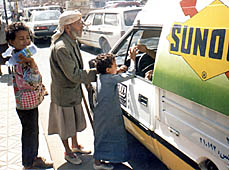
BEGGING: Driven by Easy Money or Need? [Archives:1998/30/Reportage]
July 27 1998
The Republic of Yemen is a poor country, by whatever yardstick you take it. The per capita GDP is less than ONE US Dollar a day. That is one side to the story.
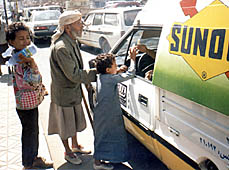
Finally, in the Republic of Yemen, unemployment is high, touching on 40%.
Those factors have resulted in a high number of vulnerable people. Begging has become their ‘only’ recourse. Thus, the number of beggars in Yemen has achieved the highest growth rate in the land, especially in large cities.
To look into this problem, Ahlam Al-Mutawakkil of Yemen Times took to the streets of Sanaa. Here is what she found.
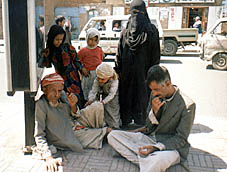
Samira is a little girl of about 11 with her 5-year-old sister. She refused to talk at first, but I managed to coax her with a small handout. Her father has a spinal injury because of his work selling scrap metal, and her mother is pregnant and is always busy doing the household chores.
“I have 9 brothers and sisters, 4 of us go out begging in the streets,” she explained with casting her eyes to the ground. “Altogether, we earn between 200 and 600 riyal a day, which all go towards the house rent (5000 riyals), food, clothing, etc.” Samira has been begging for the last 3 years. “I hope I’m able to go to school,” lamented Samira.
People’s response to her varies. Some tell her to go home; while, teenage boys in flashy cars ask her to go for a ride. Other people are more sarcastic, saying that she is like a mosque speaker – distributing prayers for people, in reference to her incessant calls for God to favor the people who give her money. Few passers-by are more sympathetic, giving her small alms.
Hassan:
At the other end of the scale is Hassan, a blind old man who has been begging for the last 3 years. Hassan’s family – his wife and 9 children – are in their village in Reima. He is led in the streets by his 6-year-old boy. “My wife sometimes comes to Sanaa for the sole purpose of begging,” said Hassan, matter-of-factly. “We beg for the sake of our children, we want to send them to school.” Hassan has several brothers, but they never bothered to help him after the death of their father. He get about 100 to 300 riyals a day.
Mohammed:
Originally from Hodeidah, Mohammed is disabled. He is married with 7 children, and has recently arrived in Sanaa to beg in the capital’s more promising streets. “Since I can’t work because of my disability, my brother used to help me but he died 6 years ago, leaving to take care of a huge family,” said Mohammed ruefully. Begging in Sanaa earns Mohammed about 300 riyals a day, most of which he send to the village to support his extended family.
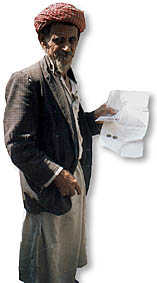
Hajj Ali Saleh:
This man has a wholly different story to tell. “I have to go out begging in order to help my daughter-in-law, who has undergone a very complicated and expensive surgery at Al-Jumhouri Hospital,” he explained bitterly.
A farmer for Mahweet, Hajj Ali carries with him all the hospital invoices to prove that he is sincere. “She needs further treatment, more x-rays, more lab tests, for which we don’t have any money.”
Does not farming provide good income for Hajj Ali and his family?
“We plant corn, not as profitable as qat. The little income we get is just not sufficient. The Ministry of Agriculture always promises to provide us with water projects, etc, but they don’t keep their promise.”
Qahtan Ali:
He is a blind man, and walks the streets with his little daughter. “I have to feed and clothe my wife and 6 children and pay the 6,000-riyal rent,” he says, “and begging is the only way out.” From Qahtan’s point of view, begging is a “skill and some people are just luckier than others in this ‘trade.'”
Qahtan and his family receive 1,000 riyals per month by way of social security! They used to get some food supplies as well. Now even that has stopped.
“We need at least 500 riyals a day to keep us going,” he explained. “My wife always nags me asking for more money. I try hard to raise as much as I can by changing begging spots.”
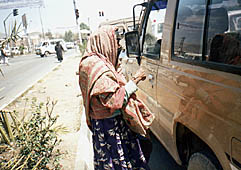
Amina is an old woman from Ibb: “I only have to beg to obtain a the fare to go back to my village. I came to Sanaa for medical treatment after falling from a high place. My son disappeared during the civil war, now a benevolent man is supporting me and my son’s family. I don’t really need to beg.”
A very old woman:
Then there is the old woman who can remember the Turkish days in Yemen. She walks the streets of Sanaa on he own. “I’m very ill. My sons died in a car crash while on their to Hodeida, and my husband died ages ago. I receive 1,000 riyals from the social security. This is not enough for food, let alone the medicines I need.” She only earns about 100 riyals a day. “I know many people who don’t need to beg, but they do it out of habit. This makes people think that all of us are not worthy of their help.”
——
[archive-e:30-v:1998-y:1998-d:1998-07-27-p:./1998/iss30/report.htm]


